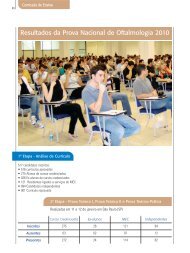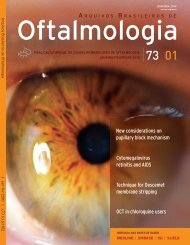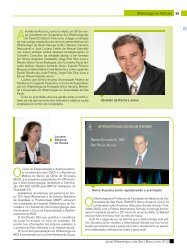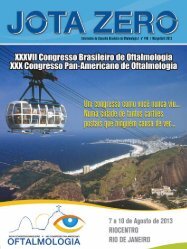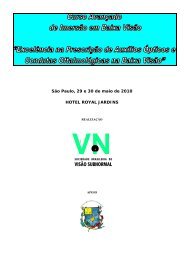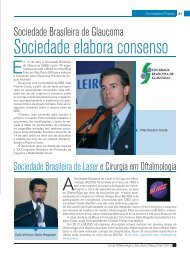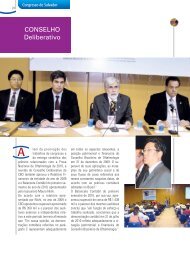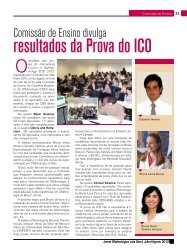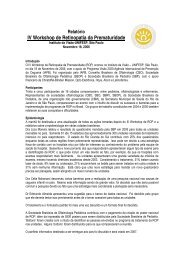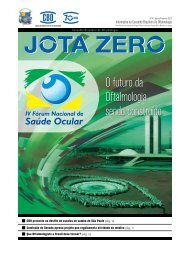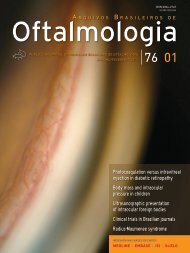Ocular rosacea Crotoxin for paralysis of extraocular muscles ...
Ocular rosacea Crotoxin for paralysis of extraocular muscles ...
Ocular rosacea Crotoxin for paralysis of extraocular muscles ...
Create successful ePaper yourself
Turn your PDF publications into a flip-book with our unique Google optimized e-Paper software.
Editorial | Editorial<br />
In this issue <strong>of</strong> the ABO<br />
Neste fascículo dos ABO<br />
Wallace Chamon<br />
Several original and unpublished articles <strong>of</strong> great clinical importance are published in this issue <strong>of</strong> the ABO,<br />
showing that, increasingly, the authors recognize the quality and comprehensiveness <strong>of</strong> our journal.<br />
A publication with the highest incidence <strong>of</strong> infectious endophthalmitis by Pseudomonas aeruginosa in the<br />
world (1) revealed that 20% <strong>of</strong> the 45 eyes that underwent vitrectomy presented visual acuity <strong>of</strong> at least 20/200.<br />
Although the source <strong>of</strong> the outbreak has not been identified, all patients had undergone cataract surgery by<br />
phacoemulsification in a single institution in a given period <strong>of</strong> two days. This leads to the conclusion that it was<br />
an intraoperative source and <strong>for</strong>ces readers to question the antiseptic methods currently used in eye surgery.<br />
Again the theme <strong>of</strong> evidence-based medicine is covered in ABO. A systematic review <strong>of</strong> the risks and benefits<br />
<strong>of</strong> radiotherapy, with or without the use <strong>of</strong> glucocorticoids, <strong>for</strong> the treatment <strong>of</strong> Graves’ ophthalmopathy presented<br />
in this issue is the most comprehensive ever published in the world literature (2) . The authors identified 359<br />
scientific articles on the subject in the various data sources and selected the eight ones that were randomized<br />
controlled trials, with data available. With the meta-analysis <strong>of</strong> 439 patients involved in these studies, the authors<br />
concluded that radiotherapy, especially when associated with glucocorticoid treatment, is effective in the active<br />
phase <strong>of</strong> the disease and must be indicated in the earlier stages <strong>of</strong> the same.<br />
Two unpublished case reports are presented in this issue: the first report <strong>of</strong> buphthalmos in adult (3) and the<br />
first publication <strong>of</strong> optical coherence tomography (OCT) images <strong>of</strong> gelatinous drop-like corneal dystrophy (4) . The<br />
first makes readers question the importance <strong>of</strong> assessing scleral elasticity in different stages <strong>of</strong> life and in different<br />
diseases, while the second shows an excellent correlation with the OCT images and pathology, including the<br />
typical birefringence under polarized light observed in this dystrophy.<br />
The prevalence <strong>of</strong> the causes <strong>of</strong> blindness in Paraguay, was evaluated in an epidemiological study conducted<br />
by Paraguayan institutions in collaboration with authors from U.S. institutions and from the International Agency<br />
<strong>for</strong> Prevention <strong>of</strong> Blindness (IAPB) (5) . The authors found a lower prevalence <strong>of</strong> visual impairment in relation the<br />
only previous population-based study from the same country, in 2003 (6) . The importance <strong>of</strong> this paper lies in<br />
the fact that, although almost 10% <strong>of</strong> people with bilateral blindness live in the Americas, methodologically<br />
appropriate, ophthalmic population-based studies are infrequent in Latin America (7) .<br />
Also in this issue, it has been described, <strong>for</strong> the first time, the effects <strong>of</strong> a neurotoxin isolated from the venom<br />
<strong>of</strong> a South American rattlesnake in the external ocular <strong>muscles</strong> (8) . The crotoxin was applied to the superior rectus<br />
muscle <strong>of</strong> rabbits and compared with botulinum toxin type A. The authors concluded that, when used at a<br />
concentration <strong>of</strong> 1.5 µg, the effect <strong>of</strong> the crotoxin was similar to botulinum toxin type A.<br />
ReferENCES<br />
1. Guerra RLL, Freitas BP, Parcero CMFM, Maia Jr OO, Marback RL. An outbreak <strong>of</strong> <strong>for</strong>ty<br />
five cases <strong>of</strong> Pseudomonas aeruginosa acute endophthalmitis after phacoemulsification.<br />
Arq Bras Oftalmol. 2012;75(5):344-7.<br />
2. Viani GA, Boin AC, de Fendi LI, Fonseca EC, Stefano EJ, de Paula JS. Radiation therapy<br />
<strong>for</strong> Graves’ ophthalmopathy: a systematic review and meta-analysis <strong>of</strong> randomized<br />
controlled trials. Arq Bras Oftalmol. 2012;75(5):324-32.<br />
3. Alves M, Malki LT, Rocha EM. Buphthalmos development in adult: case report. Arq Bras<br />
Oftalmol. 2012;75(5):361-2.<br />
4. Magalhães OA, Rymer S, Marinho DR, Kwitko S, Cardoso IH, Kliemann L. Optical coherence<br />
tomography image in gelatinous drop-like corneal dystrophy: case report. Arq<br />
Bras Oftalmol. 2012;75(5):356-7.<br />
5. Yaacov-Peña F, Jure D, Ocampos J, Samudio M, Furtado JM, Carter MJ, Lansingh VC.<br />
Prevalence and causes <strong>of</strong> blindness in an urban area <strong>of</strong> Paraguay. Arq Bras Oftalmol.<br />
2012;75(5):341-3.<br />
6. Duerksen R, Limburg H, Carron JE, Foster A. Cataract blindness in Paraguay results <strong>of</strong><br />
a national survey. Ophthalmic Epidemiol. 2003;10(5):349 -57.<br />
7. Pascolini D, Mariotti SP. Global estimates <strong>of</strong> visual impairment - 2010. Br J Ophthalmol.<br />
2012;96(5):614-8.<br />
8. Ribeiro GB, Almeida HC, Velaverde DT, Sá MLVM. Study <strong>of</strong> crotoxin on the induction <strong>of</strong><br />
<strong>paralysis</strong> in <strong>extraocular</strong> muscle in animal model. Arq Bras Oftalmol. 2012;75(5):307-12.<br />
Submitted <strong>for</strong> publication: October 5, 2012<br />
Accepted <strong>for</strong> publication: October 5, 2012<br />
1<br />
Physician, Department <strong>of</strong> Ophthalmology, Escola Paulista de Medicina - EPM, Universidade Federal<br />
de São Paulo - UNIFESP - São Paulo (SP), Brazil.<br />
Funding: No specific financial support was available <strong>for</strong> this study.<br />
Disclosure <strong>of</strong> potencial <strong>of</strong> interest: W.Chamon, None.<br />
306 Arq Bras Oftalmol. 2012;75(5):306



